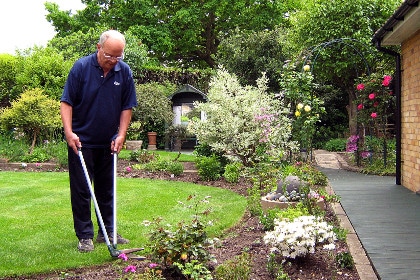This year sees the 70th Birthday of our NHS and over the past seven decades we have seen significant improvements in life expectancy with people often living for many years following illnesses which in the past they would not have survived.
This is great news but what it does mean is more of us are now living with a disability or one or more long-term health conditions. These are illnesses that often can’t be cured but can usually be controlled with medicines or other treatments and include conditions such as arthritis, asthma, diabetes, epilepsy, COPD and high blood pressure.
People with the conditions listed above often become experts in managing their own symptoms and medicines but taking care of yourself also includes the activities you can do every day to stay as fit and well as you can with your condition and look after your mental wellbeing.

Health charity The King’s Fund recently published a report highlighting health benefits of gardening which include reducing anxiety, stress and depression and tackling the negative effects of loneliness and isolation.
But this is something those of us with green fingers would have been able to tell you anyway!
We could also tell you that working in your garden is a great way to have you lifting, get you bending and what’s more, it keeps you at it all much longer than a gym or home DVD workout because you’re not going to get bored.
All that gentle weeding, potting and watering is basically a nifty, covert exercise programme designed to quietly boost your strength, flexibility and endurance and help to reduce the risk of health problems caused by the sedentary lifestyle that far too many of us experience these days.
If you’re not convinced yet, AXA PPP healthcare has produced this useful infographic, that sets out 11 health benefits of gardening which shows, among other things, just how many calories it’s possible to burn an hour doing some of those routine garden jobs we possibly don’t think twice about.
Well, this is all very well and good, I hear you say, but remember I’m not as fit as I used to be.
And this is where the beauty of gardening lies. It’s completely personal and (sometimes with a bit of extra support) you can tailor jobs to what you feel up to doing on a given day so there is always something you can achieve.
Whether you have a lifelong love of gardening or it’s something you have been advised to take up as a new activity, there is a vast amount of information and guidance available to help you tailor jobs to your individual needs.
One of your first stops on your new gardening adventure should be the brilliant www.carryongardening.org.uk website. The brainchild of gardening charity Thrive, Carry on Gardening is full of practical information to make all the usual garden jobs (from preparation to pruning, mowing the lawn to moving things about the place) achievable for people with health needs or a disability.

The website covers some really specific issues including how to carry out garden jobs if you can’t bend easily, are managing heart disease or even if you have to do your tasks one-handed.
For each gardening job you can think of, they list their top tips (pulled from years of working with gardeners with additional needs) to make the task easier, including advice on keeping yourself safe and details of some of the tools of the trade that will be especially helpful to you.
There may be things you need to bear in mind about your health condition when you are planning your gardening activities. It’s always best to check with the clinician in charge of your care before you take up a new activity or if you have been newly diagnosed.
Additionally, most of the health charities have great sources of very specific advice and help about living with long-term health conditions on their website and many have phone lines you can contact for specific advice.
For example:
Many people with a breathing condition find that gardening can become tougher when they get short of breath. Some people may find they have to adopt strategies and do things a little differently to others or how they have done things in the past.
People with lung conditions suggested the following top tips on a British Lung Foundation online forum:
Even if it can trigger your asthma symptoms, there are steps you can take to lower your risk and still be able to enjoy getting out in the garden.
According to Asthma UK understanding what triggers your asthma symptoms can help you reduce the risk and exposure to them. Allergens such as pollen or mould can cause some people problems while for others it can be triggered by strongly perfumed flowers or shrubs.
While you probably can’t evade all of the possible triggers found in the average garden, there are a few practical steps to help reduce the risk of making your symptoms flare up such as being aware of what pollen is about at what time of year, trying not to take pollen back in the house with you by removing your gardening clothes and keeping an eye on the weather as hot, dry and windy days can be worse for people with pollen allergies.
If you want to plan a low allergen garden, here are some things to consider:

Little and often is the best way to approach garden jobs when you have arthritis, according to Arthritis Research UK.
Their tips include:
For example, the quality of your soil often determines how difficult it is to work with. If you have heavy clay then improving this with soil improver, sharp sand or grit can make it easier to dig and plant up in the future.
The war against weeds can be fought easier with a few weapons at your disposal. For example, using a shredded bark layer or covering your flower beds with a weed control membrane.
Rather than opting to replace your lawn with hard landscaping, you can make mowing less burdensome by having a simple geometric shaped lawn with straight edges so you don’t have to choreograph a delicate dance around the flower beds.
Storing the lawnmower (and your other garden tools) in a place you can easily access is helpful. If you are able to get a new mower then try it out for size in the shop to see if you will be able to cope easily with it; if possible go for a lighter weight model that is operated by push buttons and has handlebars with grips that you can manage.
If you’d like to keep up to date with Rolawn advice, news and special offers by email, please sign up to our Newsletter or follow us on Facebook and Twitter.
With an Honours Degree in Psychology from Durham University, and a qualification in journalism through the NCTJ, Mel draws on her knowledge of and experience in Journalism and Communications as well as her love of literature, travel and adventure to write on a range of subjects. Mel is an award-winning writer who specializes in health sector communications, but her primary passion is sled dogs and she often writes for canine-related publications and blogs.